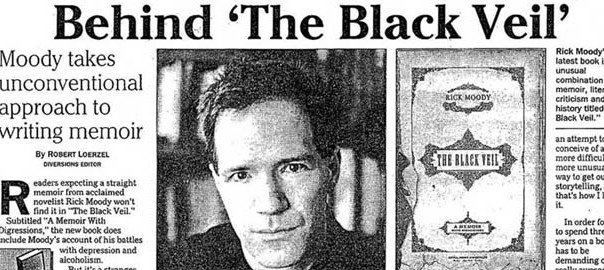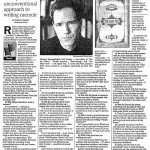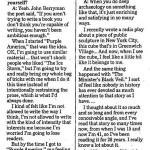This article by Robert Loerzel originally appeared in Pioneer Press on September 25, 2002.
Readers expecting a straight memoir from acclaimed novelist Rick Moody won’t find it in “The Black Veil.” Subtitled “A Memoir With Digressions,” the new book does include Moody’s account of his battles with depression and alcoholism. But it’s a stranger, more elliptical book than the typical memoir, as it traces Moody’s quest to find out more about a distant ancestor — a minister in New England who was famous for concealing his face and inspired Nathaniel Hawthorne’s short story “The Minister’s Black Veil.”
The famously reclusive novelist Thomas Pynchon wrote that Moody’s new book “takes the art of the memoir an important step into the future.” Moody, whose novel “The Ice Storm,” was the basis of the 1997 movie by director Ang Lee, … spoke with Pioneer Press last week by phone from his home in Brooklyn, N.Y.
Q: Why did you decide to write a memoir?
A: I remember … reading an interview with John Updike where he said that he didn’t like to write novels back to back. What he would do is alternate other sorts of books with novel writing to alleviate the pressure on his imagination of having to come up with novels one after another. … I had found (my novel) “Purple America” so incredibly draining as an exercise of the imagination that I needed a break. … And I just decided I would try to come up with a nonfiction book as relief from the novel. …
If I have one regret about “The Black Veil,” it’s the subtitle. Because I don’t think it’s a memoir in the conventional sense at all, and I never intended it to be. In fact, I think the real obvious kind of American memoir — you know, triumph over adversity and all that — is hackneyed and in need of a good, stiff kick. I never wanted to write one of those.
Really, I thought I was writing about Hawthorne and my family’s strange connections with Hawthorne and the Hawthorne short story, “The Minister’s Black Veil.” In order to do so, it seemed to me it was natural to put myself in as a character. But that doesn’t mean that the book is … primarily recollective or primarily nostalgic. It was meant to be much more ambitious than that and much more sort of protean. It needs to have a lot of different stuff going on in it. To oversimplify it into the condition of memoir is to make readers unhappy, because it’s not going to be that kind of a book for them.
Q: Did the portions of the book dealing with your life take on a bigger role as you wrote the book?
A: It seemed to me that if I didn’t write about the particularly sad part of my life … it was going to be a black hole in the universe of the book, sort of sucking all the energy out of it, because it has so much to do with “The Minister’s Black Veil.” There’s a big section in the middle about my unfortunate stay in a psychiatric hospital when I was in my 20s. To not talk about that — to go all the way through this ordeal of talking about “The Minister’s Black Veil” and how sad and dark that story is without saying that my own life had a sad, dark chapter — would be extremely strange. It just became natural to include the material in this book. The fight really was to permit myself to do that. It was very hard work to write those sections, demanding and sort of scary in some ways. But I ultimately decided that was the best thing for the book.
Q: Why not do a straight memoir?
A: I might do one when I’m 60. The problem is the sort of community I grew up in — Northeastern WASP community — is, socially speaking, incredibly bad at talking about itself. So in a way, this is the kind of WASP memoir, where everything is done through indirection, everything’s done in lateral ways instead of straight-on. This sort of is how WASPs talk about themselves. WASPs, always on the verge of getting to the important part of the story, change the subject or talk about the weather.
Q: Was this all based on memory, or are you one of those people who keeps a journal or diary?
A: No, absolutely not. Never have. Everything that’s of use or of any interest in my life eventually gets channeled into the work somehow, and that’s as close as I get to diaristic writing.
Q: Did it work as a break between writing novels or did it prove to be just as stressful as writing “Purple America”?
A: It was actually worse. Which was too bad. But I am back writing fiction now, and I feel like I have a lot to say again in that form. So that much of the plan was effective.
Q: What’s the novel are you working on now?
A: It’s sort of about television, the medium and the business. … It’s about an independent producer who stakes her career on a television miniseries.
Q: How would describe your evolution as a fiction writer?
A: What I think I’m doing is posing greater challenges to myself with each book. With my first novel, a not-very-often-read-and-for-good-reasons novel called “Garden State,” I was just trying to figure out how to make a novel at all. But since then, each book has been an attempt to conceive of a more difficult, more unusual way to get out storytelling, and that’s how I like it. In order for me to spend three years on a book, it has to be demanding on a really awesome scale. Otherwise, it’s just pushing paper around.
Q: Do you often encounter people who are more familiar with the movie of “The Ice Storm” than your book? What’s your reaction to that?
A: That’s the sad situation in American literature right now. What we (novelists) do culturally doesn’t have the same premium that television and the movies have in terms of cultural impact. One thing that I felt about the movie when it was happening was that whether it was good or bad — and I actually think it was pretty great — it was going to be a big unavoidable billboard for the book. And to the extent that that was true, I’m happy, because it did lead readers to my work. Some of them are only interested in “The Ice Storm,” and that’s cool. But actually, a big bunch of them got interested in my other work as well.
Q: Was the idea of the storm something you thought of when you began writing that novel, or did it come later in the writing process?
A: There’s a great apocryphal story about some 19th-century novelist who said to a friend, “My novel’s all done. I just have to go back and put in the theme.” But actually, the storm was first with the book. There was such a storm in 1973 in the Northeast, and everyone who grew up where I grew up in the Connecticut suburbs or in Long Island or in northern Jersey has a story about the ’73 ice storm. It was a really big deal, sort of a touchstone for everyone’s childhood. So really, the idea was to use something I knew a whole lot about, which is to say, the suburbs in the ’70s, and then I just created characters and set pieces to work with that material.
Q: In “Purple America,” again you’ve got a subtext of something happening. This time, it’s the nuclear reactor. What was the inspiration for using that as a subject?
A: It’s actually a little joke to myself. … The novelist Jeffrey Eugenides … described “The Ice Storm” as a “nuclear family meltdown.” And you know, I’d been thinking about that and the attention to family that seems to come to me naturally, when I was getting ready to write “Purple America.” And I just thought I would make it an actual nuclear family drama, in all the senses of the word. It is true that I like these big deus ex machina forces working in the books, and that the nuclear meltdown is like the ice storm. They are metaphors for theological musings or something, and that’s why like them so much.
Q: By the time of this novel, you were using a lot longer paragraphs. Some go on for whole pages, stream-of-consciousness writing that simulates a dream, for example. Was that part of your effort to challenge yourself?
A: Yeah. John Berryman the poet said, “If you aren’t trying to write a book you don’t think you’re capable of writing, you haven’t been ambitious enough.” When I started “Purple America,” that was the idea. OK, I’m going to use similar material … that won’t shock people who liked “The Ice Storm,” but I’m going to try and really bring my whole bag of tricks with me when I do it this time instead of intentionally restraining the prose, which is what I’d always done. I kind of felt like I’m not allowed to write the way I think, I’m not allowed to write with the kind of intensity that interests me because I’m worried I’m going to lose readers. But by the time I got to “Purple America,” my feeling was just, “I’m going to really go for it, try to hit the ball out of the park, and see if the readers come along with me.”
Q: You’re discouraging us from thinking of “The Black Veil” as a memoir. Typically, authors who write memoirs say things like, “I wrote this book about my struggle with alcoholism, and since then, hundreds of readers have talked to me and shared their experience.” With your book being a little different, I’m wondering if you still get that kind of response.
A: I do, actually. Some of the publicity surrounding the book has concentrated on the depression section of the book, to the exclusion of the other sort of material, which is from my point of view reductive. And I worry that readers who approach the book with that in mind and are thinking it’s going to deliver in traditional ways are going to be disappointed. And yet, a lot of venues in which I read, people came up to me afterwards wanting to talk about depression and about what I’d done to try to overcome that problem and so forth. While I don’t want to reduce the book and oversimplify it, I also don’t want to drive off readers who are getting something from it along those lines. In fact, I would like to be of service and helpful if people are suffering and they want to talk about it. That’s something I know a lot about and I’m happy to show up for it.
Q: What was like it spending so much time delving into Hawthorne’s short story and its possible meanings?
A: When you do deep archaeology on something like that, it’s just enriching and satisfying in so many ways. I recently wrote a radio play about a piece of public sculpture in New York City, this cube that’s in Greenwich Village. … And now, when I see the cube, I feel like a little bit like it belongs to me. And the same thing happened with ‘‘The Minister’s Black Veil.” I sort of feel like nobody in history has ever devoted as much attention to that story as I have. I thought about it so much and so long and from every conceivable angle, and I’ve read that story so many times now, from when I was 15 and now I’m 41, so I’ve been reading it for 26 years. I really know a lot about it. And it’s an incredibly rich, mysterious, open, bleak short story. … Hawthorne probably dashed off in six weeks. And I spent four years thinking about it.
But to me, when you really try and get underneath a story, especially a story like that, that doesn’t allow itself to be decoded easily — when you do that, you really get somewhere. I want books to be as complex and unfathomable as people are, you know? You can’t exhaust a person. You can hang out with them for years, and you always scratch new layers and find parts of their character that you didn’t know about before. And reading experiences for me, really valuable ones, are like that. And “The Black Veil” is really just an account of one reading experience that’s gone on for a really, really long time.


